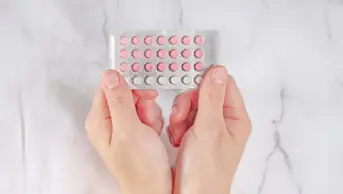
Alamy Stock Photo
Women of childbearing potential on sodium valproate will be included in the list of patients that should be seen by pharmacists for structured medication reviews, Keith Ridge, the chief pharmaceutical officer for England, has said.
This is expected to contribute towards NHS England’s aim of halving valproate use in women of childbearing age by 2023.
However, according to the latest data, 180 women were prescribed valproate, a medicine used to treat epilepsy and bipolar disorder, during their pregnancy between April 2018 and September 2020.
Speaking at the Clinical Pharmacy Congress on 12 May 2021, Ridge said there had been “some decline in the use of valproate over recent years but that rate of decline is slow”.
“There are 20,000 women of childbearing age in this country [that] are taking valproate, and we should be acting to safely reduce that number, but also to make sure valproate is only initiated in women of childbearing age as a last resort and where other safer medicines have been tried,” he said, adding that “in the near future, women will be offered safety reviews”.
Slides accompanying his presentation specified that the safety reviews are “to be included in new guidance supporting PCN [primary care network] structured medication reviews (SMRs)”.
PCNs have been required to offer SMRs since October 2020 and had conducted 12,222 by September 2020.
SMRs are currently available to patients who have been diagnosed with frailty or who are living in care homes; with complex polypharmacy; with multiple long-term conditions; and/or with high numbers of prescribed addictive pain management medication.
The criteria were most recently updated in April 2021 to clarify “addictive pain management medication” as opioids, gabapentinoids, benzodiazepines and Z-drugs in an updated PCN contract.
Women of childbearing potential on valproate are currently supported by the Pregnancy Prevention Programme (PPP), which is a system of ensuring all female patients taking valproate medicines have been told and understand the risks of using the medicine in pregnancy.
As part of the PPP, patients must sign a risk acknowledgement form; be on highly effective contraception if necessary; and see their specialist at least every year.
However, a report from the Independent Medicines and Medical Devices Safety Review in 2020 found that “despite the efforts of the [PPP], women are still becoming pregnant while [taking] valproate, without any knowledge of the risks”.
Meanwhile, a survey by three epilepsy charities in July 2020 found that just under half of pharmacists were not discussing the risks of taking sodium valproate when dispensing the drug to women, and just over half of pharmacists were not providing a patient card warning of the risks.
Both of these actions are recommended by the Medicines and Healthcare products Regulatory Agency, which introduced the advice in 2018 owing to the risks of birth defects if the antiepileptic drug is taken during pregnancy. These actions are also monitored during inspections by the General Pharmaceutical Council.
Ridge called for pharmacists’ “personal commitment as pharmacy professionals to ensure if valproate is to be used in women of childbearing age, then it’s done as safely as possible”.
“Please make this a priority now and ensure all proper steps are being taken to protect women of childbearing age,” he continued.
“A national valproate safety implementation group has been established, and we would like to reduce valproate use in women of childbearing age by 50% by 2023, and we’re going to need your help to do that.”
Daniel Jennings, senior policy and campaigns officer at Epilepsy Action, said it welcomes “any further measures to ensure that women and girls are made aware of the risks of taking valproate while pregnant”.
“We know that, despite recent efforts, there are still women who are unaware of the risks, and women still taking valproate during pregnancy. These additional safety reviews should go some way to addressing this issue,” he said.
“However, more still needs to be done to ensure that these conversations are happening, and Epilepsy Action are therefore continuing to call for all women with epilepsy to receive pre-conception counselling and family planning advice.”


